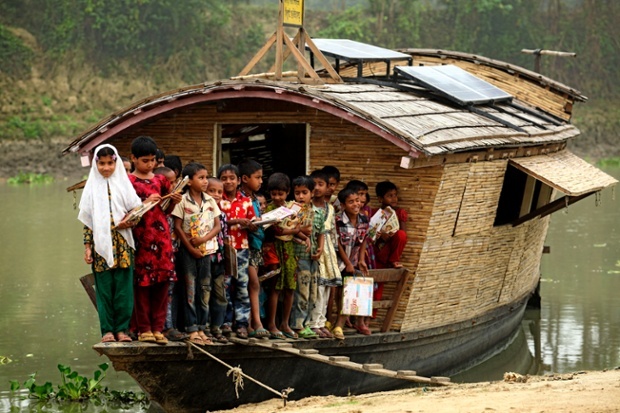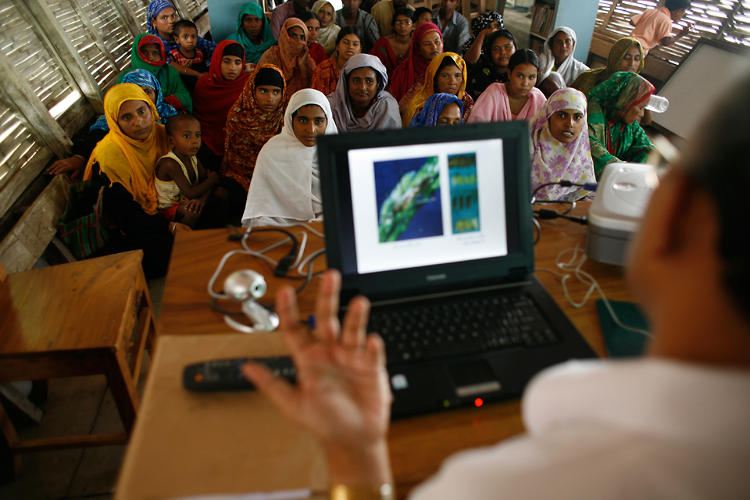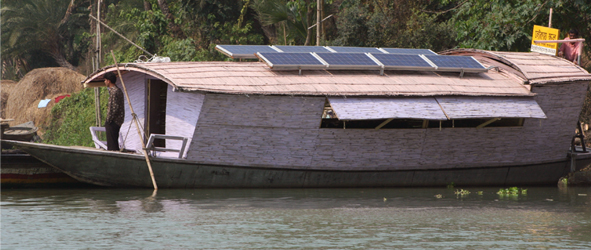29 Oct Energy: Solar Powered School Boats in Bangladesh
Problem: Massive Flooding in Bangladesh
In Bangladesh, annual flooding can disrupt school for almost a million students. In many areas, roads are impassable during the rainy season from July to October, when rivers rise as much as 4 meters (12 feet). In the worst scenarios, people are drowned and left homeless. In 1998, flooding inundated two-thirds of the country, killing 700 people and leaving 21 million people homeless. The future is not going to get better with scientists projecting over one million Bangladeshis displaced by rising sea levels by 2050.

Solar powered school boats offers education to kids in Bangaldesh (Image: Shidhulai Swanirvar Sangstha).
A homegrown nonprofit organization called Shidhulai Swanirvar Sangstha has built a fleet of solar powered school boats to ensure education regardless of flooding or rising sea levels. Shidhulai is the name of a village in Bangladesh and Swanirvar Sangstha means self-reliant organization. Mohammed Rezwan, Shidhulai’s founder and executive director, grew up in the country’s northwest, where his organization operates. Growing up, his family owned a boat, which meant that he was one of the lucky ones who could attend classes all year. “Many friends and relatives were denied access to education,” he said. “I thought if the children cannot come to school because of floods, then the school should go to them by boat.”
Interested in more of my posts and other writings outside of Impact Hound? Follow me on Twitter: @shenge86
The history of Shidhulai from founding to today was an arduous process. He founded Shidhulai with about $500 in 1998, when he graduated with an architecture degree from the Bangladesh University of Engineering and Technology in Dhaka. Only 22, he had no experience in fundraising but he searched the Internet for organizations that could help him and submitted proposals. It took four years before his first boat school was introduced in 2002.
Things took off from there. In 2003, Shidhulai received a $5,000 grant from the Global Fund for Children in the United States, and then $100,000 from the Levi’s Foundation, part of the clothing company that has factories in Bangladesh. A $1 million grant from the Bill & Melinda Gates Foundation in 2005 allowed Shidhulai to build more boats, buy computers, install solar power, and create a central library. Last year, it added another boat after winning a $20,000 prize from the World Innovation Summit for Education, or WISE, created by the Qatar Foundation.
Today, Shidhulai employs more than 200 staff members — including 61 teachers and 48 boat drivers — and 300 volunteers. The boat schools are registered with the Education Ministry, which provides free materials for grades three and four. Shidhulai trains the teachers, who are from the local community and usually have a 12th grade education. The organization now has 20 schools — mostly for the young children of landless families — 10 libraries and 7 adult education centers, all on boats. Students board at rural pickup points and then attend classes for two or three hours, six days a week. In many cases, this will be the only education they get. There are also five floating health clinics that help transport medical staff to remote areas.

Each floating solar powered school boat has Internet, a laptop, and a small library (Image: Fast Company).
Sweetie Khatun, an 11-year-old reading a book called “Rhyme from the Lips of Birds,” declared that she loved the library and said that it was “beautiful.”
“The school on land is closed in monsoon,” said Eti Khatum, 9, a student on the boat school, with two long ponytails and a gold-colored shawl. “This school floats all year.”
Meanwhile, free adult classes focus on practical issues. On an afternoon, one might see a room of women in brightly colored saris sitting on a boat watching a slide show by an agricultural expert, who teaches them how to use organic insecticides made of neem tree leaves, among other tips. Khadiza Begum, 27, said that over the past four years, she had learned to grow cucumber and different types of gourds, increasing her crop yields. Without the boat schools, she said, “There is no other way to learn.”
The Boats
Mr. Rezwan designed the schools by modifying traditional Bangladeshi wooden boats called noka which are about 15 meters (50 feet) long and 3 meters (10 feet) wide with main cabins that can fit about 30 people. Weatherproof roofs withstand heavy monsoon rains and are supported by arched metal beams instead of columns, which would obstruct the classroom. Sitting low in water, it has flexible wooden floors and higher ceilings.
The waterproof roofs are outfitted with solar panels. PV modules installed on the boat rooftops provide between 200 Wp, 600 Wp, and 1-2 kWp of power, depending on the electrical demand. The PV modules charge an array of lead-acid batteries through a charge controller, which prevents the battery from being over-charged or deep-discharged, and also include an inverter to convert DC power to AC, thus allowing the use of AC electrical equipment on the boat. Boats also have PV-powered lighting.
Rezwan oversees a small army of engineers and technicians, who manufacture everything from PV panels to bicycle-powered pumps. The installation and maintenance of the PV systems are done entirely by Shidhulai’s trained engineer and technicians. Each school boat has Internet, a laptop, and a small library. Construction takes three or four months and costs about $18,000 for local boat builders to modify an old vessel. An additional $6,500 a year is needed to pay for salaries, supplies, fuel, and other costs for each boat.

A Shidhulai Swanirvar Sangstha solar powered school boat (Image: Shidhulai Swanirvar Sangstha).
The Future
Rezwan compares the current program of solar powered school boats to the combination of a school and a school bus. Mr. Rezwan plans to add one hundred more boats in the next five years to reach an additional 100,000 people. He says, “Our floating schools are combination of school bus and school house.”
In a floating library down the river, students checked cricket scores on two computers and perused books from the 1,500 available volumes. With education comes confidence. One villager said, “After this library came to our village, we started to believe in ourselves.”
Shidhulai doesn’t just work on solar powered school boats. It is also using local resources and solar energy to transform the entire community. By distributing three types of solar lamps to students who attend school regularly, hardworking students and their families can continue to do their work even after dark. The lamps can light homes or charge cell phones, and the batteries can be recharged at the boats weekly.
Shidhulai also focuses on improving families’ access to farming techniques. Rezwan created a system he calls “solar water farming,” which lets stranded villagers to harness solar power to continue feeding themselves even without access to land or fertilizer.”[The system includes] floating beds made of water hyacinth [to grow vegetables], a portable circular enclosure created by fishing net and bamboo strips [to raise fish], and a floating duck coop powered by solar lamps,” he told Fast Company’s Co.Design. “It has a recycling system–duck manure is used as fish foods, old water hyacinth beds are sold as organic fertilizer, and the sun energy lights up the duck coop to maintain the egg production.”
Though flooding will continue in Bangladesh, the future appears bright thanks to social entrepreneurs like Rezwan who has used local resources combined with modern solar energy devices to create solar powered school boats. Other countries are also taking notice. So far, Shidhulai’s floating solar powered school boats model has been replicated in Nigeria, Cambodia, Philippines, Vietnam and Zambia.
What You Can Do
If you have a boat, perhaps you would be interested in purchasing a set of solar panels for your boat to see how renewable energy can help you reduce your costs.
If you are feeling generous, Shidhulai is always looking for donations.
Interested in more of my posts and other writings outside of Impact Hound? Follow me on Twitter: @shenge86
[2] http://www.shidhulai.org/afftechnology.html
[3] http://www.ashden.org/winners/shidhulai
[4] http://www.nytimes.com/2013/07/01/world/asia/floating-schools-in-bangladesh.html?_r=0
[5] http://www.fastcodesign.com/1671401/floating-schools-designed-to-fight-floods-in-bangladesh#1
[7] http://www.julielindsay.net/2014/04/teachertuesday-bangladesh-learning-on.html


